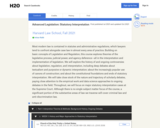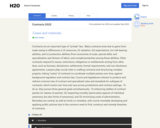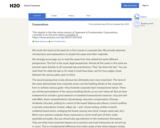42 Results

Most modern law is contained in statutes and administrative regulations, which lawyers tend to confront alongside case law in almost every area of practice. Building on basic concepts of Legislation and Regulation, this course explores theories of the legislative process, judicial power, and agency deference—all in the interpretation and implementation of legislation. We will explore the history of and ongoing controversies about legislation, regulation, and interpretation, including deep debates about textualism and purposive or dynamic interpretation; about the increasingly popular use of canons of construction; and about the constitutional foundations and ends of statutory interpretation. We will take close stock of the nature and trajectory of scholarly debates, paying close attention to the empirical work and data science approaches to ongoing debates in the field. Throughout, we will focus on major statutory interpretation cases at the Supreme Court. Although there is no single subject matter focus of the course, a significant portion of the substantive areas of law we traverse will cover criminal law and anti-discrimination law.

This coursebook was created to support a course examining the experience of Asians and Asian Americans at various points in United States history. Three main areas of focus are immigration in the early 20th century, World War II, and the early 21st century.

This collection of classic articles in international trade law was selected by Richard H. Steinberg, Professor of Law, Jonathan D. Varat Endowed Chair in Law, Professor of Political Science.
Wherever possible, the casebook links to a free version of the final article on the website of the journal, author, or a reputable university or international organization.If no free version of a final article is available from a reputable website, this casebook links to a version of the final article available from a paid database, plus any freely available preprint or reprint of the article. Most university students should be able to access the paid databases through their schools' libraries. Please check your library's website for information on their VPN or proxy and contact the librarians for assistance if necessary. UCLA law students should visit https://my.law.ucla.edu/vpn.

This open source casebook is a companion to my book, Fidelity & Constraint (Oxford 2019). It covers the course material of federalism, separation of powers, and the Civil War Amendments, organized into a framework for understanding how the Supreme Court has developed these doctrines. That framework is suggestive for domains beyond the scope of this casebook. The casebook can obviously be used independently of the book. Ideally, it would be used against the argument of the book, by adding material that contradicts or weakens the arguments that I have offered there. But the intent was to offer both readers of the book a way to see the source material more easily, and for users of the casebook to have a source to read more deeply. Obviously, there is a great deal of constitutional law not included within the scope of this casebook. Our hope is that others will remix this version, and add sections to cover the missing parts. If that use develops, we will find a way to display the competing versions. Our ultimate hope is to encourage a kind of casebook-authoring-competition, so that the extraordinary talent of law professors across the country could find an easier way to express itself, free of the economic constraints (and opportunities) of traditional publishing. AcknowledgmentsI am grateful to my friend Jonathan Zittrain for making the extraordinary talent of the Harvard Law Library available to me to complete this work.

These cases and subjects are based on the constitutional course taught by Professor Carolyn Shapiro of Chicago-Kent College of Law.Special thanks to Dean Erwin Chemerinsky for being a part of the editing of this book.

This course examines national separation of powers and federalism as core values and structural elements of the United States Constitution. It analyzes the nature and scope of the powers the U.S. Constitution vests in the three branches of the national government, the interrelationships among those branches, the distribution of powers among local, state, territorial, and federal governments, and the ways in which these structures and relationships impact democratic processes, individual rights and the advancement (or weakening) of core constitutional values, including democratic governance, equal citizenship, individual liberty and the rule of law.

Contracts are an important type of "private" law. Many contracts arise due to gains from trade owing to differences in (i) resources, (ii) valuation, (iii) expectations, (iv) risk-bearing abilities, and (v) production abilities (from economies of scale, special skills, and specialization and division of labor), and complementarities among those abilities. Other contracts respond to issues, restrictions, obligations or entitlements arising from other laws, such as licenses, disclaimers, settlements, formal requirements, and non-disclosure agreements. Lawyers play crucial roles in crafting contracts and structuring complex projects, linking "suites" of contracts to coordinate multiple parties over time, against background regulation and contract law. Courts and legislatures interact to produce and redirect common law of contract and specialized rules and standards for subtypes of contracts, which evolve over time and vary across jurisdictions and contract settings. To do so, they pursue three general goals simultaneously: (1) enhancing welfare of contract parties (or classes of parties), (2) respecting morality (particularly aspects of individual autonomy, but also limits of autonomy), and (3) minimizing costs of administration. Remedies are central, as well as limits on remedies, with courts inevitably developing and applying public policies due to the common need to find, construct and remedy breaches of contracts.

Contracting often facilitates happiness. It enables us to do things we would otherwise be unable to do and thus to live more fully, richly, enjoyably. We enter into contracts constantly, often with little consciousness about legal consequences. Typically we become self-conscious only when a problem arises. Our course will mainly be about problems arising from contracting. It is largely an exploration of contract pathology. Before we turn to problems, however, I want to emphasize ways in which contracting is satisfying.

We wrote this book as the basis for a first course in corporate law. We provide extensive introductions and explanations to situate the cases and other materials.We strongly encourage you to read the cases from two related but quite different perspectives. The first is the usual, legal perspective. Almost all the cases in this book are seminal cases familiar to all corporate law practitioners. They “lay down the law.” You can read them for what the law is, for what it could have been, and for how judges chose between the various paths open to them.The second perspective is less obvious but ultimately even more important. The facts of the cases demonstrate how corporate actors use the building blocks of the corporate form to achieve various goals—they illustrate corporate law’s transactional nature. There are infinite permutations of the various building blocks, so we can’t show all. But we have endeavored to include a good selection of standard transactional scenarios—buy-and sell-side M&A, share reclassifications (Zuckerberg), executive compensation (Disney), dividends (Sinclair), jostling for control of the board (Blasius and others), control conflicts in private corporations (Coster; eBay), etc.—and moves (voting, written consent, unilateral board action, enlarging the board, issuing new stock, merger, asset sale, etc.). Most court opinions evaluate these maneuvers or some small part of them under equitable principles. But you should also pay attention to the maneuvers themselves. They are what most corporate lawyers do in practice and most maneuvers do not end up in court. This is a fundamental difference from other areas of law where lawyers mostly get involved at the back end, so to speak.A separate reason to pay great attention to the facts is that much of corporate law consists of broad standards that take on real meaning only in their application. Understanding the law often requires reading the full facts. The judges clearly considered these factual details important, even on appeal, and so should you!With one exception, all cases in these materials are Delaware or federal cases. Delaware law is the dominant corporate law of the United States. In the U.S., each state has its own corporate law, and the applicable law is the law of the state of incorporation. Corporations are free to incorporate where they want, in return for paying incorporation tax (“franchise tax”) in that jurisdiction. Delaware has attracted more than half of all public corporations and many private corporations in the U.S. (Delaware derives a third of its state revenue from the franchise tax!) Furthermore, Delaware is also the model followed by many other states. As a result, we see no point in teaching you other states’ law. We occasionally use other countries’ laws to expose you to alternative arrangements; the variance between countries is much larger than between U.S. states.For similar reasons, we teach only corporations proper. We do not cover partnerships, limited liability companies (LLCs), or the many other entity forms now available. These other forms are undoubtedly important in practice. But an introductory course cannot teach the nuanced differences between these forms, many of which lie in tax law. We only give you a brief warning about accidental partnerships in the first class. However, there are substantial commonalities between the various entity forms. If you understand corporate law and the underlying business problems, you will easily learn the other forms when the need arises.GlossaryBylaws = a corporation’s secondary governing document (cf. DGCL 109(b)). The charter can provide, and usually does provide, that the board can amend the bylaws without shareholder consent (DGCL 109(a); contrast the charter itself, which can only be amended by board and shareholders jointly, DGCL 242(b)).Certificate of Incorporation = a corporation’s founding and primary governing document (cf. DGCL 102).Charter = certificate of incorporation.Common stock / share: see share.Debt holders = creditors.DGCL = Delaware General Corporation Law, i.e., the basic Delaware statute. As a guide to this important statute, you might want to consult simplifiedcodes.com.Dividends = an official distribution of cash or other assets to all shareholders of one class. Even though dividends are generally the only way shareholders as a group get a return on their investment (individual shareholders can also sell their shares, but that only puts the buyer of the shares into the seller's shoes), dividends are in the board's discretion (DGCL 170(a)).Equity; equity capital = the excess of assets over liabilities, if any (or equivalently, non-debt financing).Equity holders = shareholders. The term derives from the fact that roughly speaking, equity is available for distribution to shareholders.Limited liability = no liability (of shareholders). The expression “limited” comes from the observation that shareholders stand to lose whatever they put into the corporation, as this is available to satisfy the corporations' creditors' claims. However, shareholders have no liability beyond that, absent pathological circumstances.Merger = the fusion of two corporations into one (cf. DGCL 251).Preferred stock / share = stock with special rights (“preferences”), generally with respect to dividends. A standard term is that preferred shares are entitled to a certain dividend per year, payable if and when a dividend will be paid to common stockholders. In return, preferred shares often do not carry voting rights.Public corporation = a corporation whose stock is publicly traded, usually on a regulated stock exchange such as the New York Stock Exchange.Share = an interest in the corporation with rights that are defined by the corporation’s charter. Unlike debt, shares do not provide a right to fixed payouts. Rather, the board decides if and when shareholders will receive so-called dividends. The default rule is that each share provides one vote (cf. DGCL 212) and equal dividend rights; such shares are called “common shares” or “common stock.”Stock = a synonym or collective term for shares (as in “twenty shares of the corporation’s stock”).

Introduction to the Third Edition.We will keep this brief--the Second Edition has most of the information we'd like to convey about the benefits of using open-source materials. Instructors--please let us know via email if you have any feedback for us, including--most importantly--your own modifications to the materials. Open source is a two-way street! We are happy to provide teaching materials, if there is interest in them. Most of the changes in this edition are in the notes section, although we have added some materials from the first edition that were deleted in the second. As always, feel free to modify, clone, distribute, etc., as you wish.Introduction to the Second Edition.To instructors: Thank you for your interest in this casebook. Please know that you are welcome (even encouraged) to use all of the casebook or just bits and pieces, whatever suits you. You can use the H20 platform to clone the casebook and modify it to your liking. Note that a small number of our links are to items in the private domain (e.g. the Model Penal Code). Our casebook prompts users to sign in via their Santa Clara University account. You may want to replace these prompts with links that will work for your students. Please feel free to contact us with questions, comments, or suggestions for additions.To Students: We developed these materials working closely with our own students, and we believe you will find them every bit as engaging, and a good deal more current, than those you would find in a conventional casebook. We are glad that you do not have to spend 200 dollars plus on a casebook that, by and large, relies on public-domain cases. In our view, the for-profit law school casebook industry amounts to commercial exploitation of students: The cost of casebooks is one of many social and economic justice issues that, inter alia, contributes to a lack of diversity in the legal profession. It is an easy problem to fix. If your other classes have expensive casebooks, you might invite your professors to examine our casebook, and to reach out to us for advice on how to make the change to open-source materials.To Everyone: We believe there's something important about a casebook that is collaborative and open. It is a reminder that the law is a community project; one that is iterative and ongoing, one that must speak across difference. This belief is reflected in our substantive choices. For instance, our study of criminal law includes materials about prison abolition, it features notes that help students "talk back" to cases, and uses cases that offer greater representation than that found in most conventional casebooks. It also embraces the notion that there is no one definitive casebook--no "canon" of criminal law. Casebooks arose at a time when concerns about inclusivity and diversity were largely absent from the academy--not because the world was different, but because the academy was different. We hope that this project helps, in some small way, to contribute to unraveling (or at least questioning) the wisdom of the status quo.Many thanks to our excellent Summer 2021 research assistants, who helped us improve the casebook dramatically: Ryba Bhullar, Tessa Duxbury, Olivia Salguero, and Swathi Sreerangarajan.W. David Ball and Michelle Oberman, Santa Clara, CA, August 2021Introduction to the First EditionThis casebook is the result of a collaboration with a team of 11 law students, who worked with us over the course of the pandemic summer of 2020. Our project aimed to redress some of the shortcomings of conventional casebook approaches to criminal law. Too often, casebooks surface issues of mental health, sex, gender, race and sexual orientation without meaningful context to situate how these issues have been treated by the criminal legal system, how they reflect social norms, how they have changed over time, etc.). Too seldom do casebooks invite a meaningful discussion of the role of race in the criminal legal system. Instead, most are marked by a failure to acknowledge, let alone grapple with ongoing discussions of alternatives to policing, alternatives to criminalization, and critical thinking about why we deal with social problems via the criminal legal system (But see Cynthia Lee and Angela Harris’ excellent Criminal Law text for an exception). Our aim in compiling these materials was not to sanitize criminal law; it is by definition a gritty, challenging subject. Instead, we sought to be thoughtful about when and how we expose students to difficult material, aiming to give them the context and the analytical tools needed to process it. This casebook is the result of a team effort to reconsider and reframe the criminal law cannon (so many casebooks use the same cases, after all).Our working model has been central to our work, rendering this casebook less a “product” than the current version of a collective, collaborative, work-in-progress. “Our” casebook is yours—clone it, revise it, make it truly your own. And let us know how you’ve improved on our work. It is not just law as code, to quote one of our former professors Larry Lessig—it is “casebook as coding project.” The beauty of the open casebook system is that we will continue to edit and revise the materials as we use them this semester. If you would like more information about the casebook or the project, please contact David Ball or Michelle Oberman. One final note: We developed a second casebook, Current Challenges in Criminal Law, which we suggest using as a companion to this casebook. (Although it can be used independently, of course). It features links to audio and video content, keyed to the topics in the criminal law casebook. For example, a collection of podcasts on addiction (as volitional choice, as crime, as public health challenge) accompanies this book’s Actus Reus materials. There are numerous entries on alternatives to incarceration, including excerpts like Chenjerai Kumanyika's amazing interview with Ruth Wilson Gilmore. We pair our weekly classes with small-group discussions based on the supplemental material. These sessions require students to reflect on the points of intersection linking the material covered in our casebook and the chosen issue or problem, as well as to consider the law's role in relation to the issue.*We are deeply indebted to the following individuals, among others, whose work helped constitute the foundation upon which we've built: Joshua Dressler; Stephen Garvey; Cynthia Lee; Angela Harris; Jeannie Suk; Tim Wu; Amna Akbar, Alice Ristroph, Paul Butler, Allegra McLeod, Jocelyn Simonson. Thanks to Karen Tani for telling us about the Open Casebook platform! Thanks to our associate dean and colleague Mike Flynn, who found time for our work amidst the chaos of leading our school through the pandemic chaos. And thanks to our students and co-authors, who are the driving force behind this project: Cydney Chilimidos; Miriam Contreras; Jenai Howard; Christina Iriart; Angela Madrigal; Leah Mesfin; Zachary Nemirovsky; Nicholas Newman; Nathanial Perez; Michael Pons; and Phillip Yin.

The case Durham v. State serves as an introduction to the criminal law course because of its basic but profound recognition of the violence at the core of the state’s ability to arrest and punish individuals who resist the law. Law enforcement depends on force, that is, state coercion of individuals to obey the law and to submit to legal authority, through the threat of punishment.
This course deals with the what, why, and how of criminal law: What should be criminal? Why should it be criminal? How do we define a crime, and how should we punish it? It also deals with the “so what” of criminal law: How does it reflect our values? How does it shape our society? How does it contain our views of what it means to be human? What is criminal law for?
Throughout the course we will also consider the common justifications of criminal punishment: (1) retribution; (2) deterrence; (3) incapacitation; and (4) rehabilitation.

Welcome to Criminal Law II, a journey through the law of constitutional criminal procedure. This publicly available casebook is a substitute for a textbook you would otherwise purchase through the University bookstore. It contains the cases you are to read for each unit. The cases have been elided, so portions represented by blue ellipses are not required reading. You are nevertheless more than welcome to click the dots to read through the entire case.
One of the purposes behind Criminal Law II, as taught in the undergraduate department of Criminal Justice, is to explore and define the concept of "good police." Credit is owed to Det. Jimmy McNulty of The Wire, who embodies crucial aspects of good police.

On the one hand, employment law resembles contract law--a matter of private ordering between workers and hirers, or perhaps between unions and employers. On the other hand, employment law has long been seen to implicate fundamental questions of justice--what discrimination means, what workers deserve, and what the balance should be between work and the rest of life.






